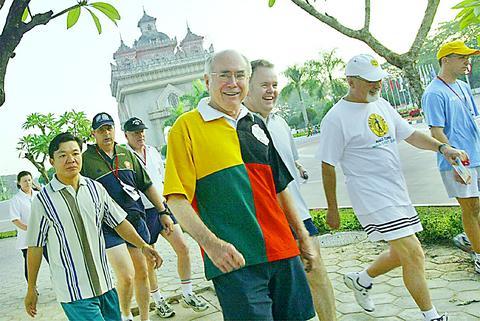Australian Prime Minister John Howard, who was to meet Southeast Asian leaders yesterday, faced pressure to sign a non-aggression pact with the region to dispel concern about his policy of pre-emptive strikes.
Howard has riled Australia's neighbors with tough talk of possible pre-emptive strikes against terrorist bases overseas, widely interpreted to mean Indonesia, although this has repeatedly been denied by Canberra.

PHOTO: EPA
ASEAN calls for Howard to sign the deal have grown louder ahead of his debut at the 10-nation group's summit, where he wants to launch talks toward a free trade deal.
"We are encouraging Australia and New Zealand to join us to accede to the TAC [Treaty of Amity and Cooperation] which they have not yet done," Philippine Foreign Minister Alberto Romulo said late Monday.
"We think that it's high time that Australia gives it serious consideration," Thai foreign ministry spokesman Sihasak Phunketkeow said.
ASEAN, which largely sees Australia as closer to the West than Asia, wants assurances about Australia's intentions.
"The way Indonesia sees it, there can be no more efficient and effective way for Australia to dispel misperceptions some quarters may have of its intentions in Southeast Asia than to simply accede to the TAC," Indonesian foreign ministry spokesman Marty Natalegawa said at the weekend.
But Australia insists it is no threat.
"There's no question of attacking Asian nations. We are a threat to nobody," Defense Minister Robert Hill said in Sydney yesterday.
"We are a peace-loving country. We will protect Australians and Australian interests, but we are a threat to nobody. Asian countries know that as well," he said.
Islamic militants have twice targeted Australians or the country's interests in Indonesia in recent years, in the 2002 Bali bombings which killed 88 Australians and in the September bombing of the Australian embassy in Jakarta.
ASEAN officials stress accession to the non-aggression treaty -- which has been signed by seven countries outside of ASEAN, including China and India -- is not a precondition for free-trade talks.
The pact calls for signatories to commit to "non-interference in the internal affairs of one another," a "renunciation of the threat or use of force" and the settlement of disputes by "peaceful means."
Canberra says this would bar it from criticizing the domestic policies of ASEAN members, for example Myanmar's internationally reviled regime.
Howard insisted Monday the TAC issue remained separate from the trade deal.
"They are two separate issues so we shouldn't confuse the two and that has been made very clear," he said in Sydney.
Negotiations on the trade deal that were expected to be announced yesterday are scheduled to run for two years, after which Australia and New Zealand would then be formally linked with the ASEAN trade bloc during the 10 years to 2017.
The aim of the agreement is to double trade and investment by 2010. Two-way trade in goods and services between ASEAN and the two countries totalled US$34.5 billion and investments reached US$8.4 billion last year.
Their combined annual economic output of US$1.3 trillion is nearly as big as that of China's US$1.4 trillion last year.
ASEAN comprises Brunei, Cambodia, Laos, Indonesia, Malaysia, Myanmar, the Philippines, Singapore, Thailand and Vietnam.

Auschwitz survivor Eva Schloss, the stepsister of teenage diarist Anne Frank and a tireless educator about the horrors of the Holocaust, has died. She was 96. The Anne Frank Trust UK, of which Schloss was honorary president, said she died on Saturday in London, where she lived. Britain’s King Charles III said he was “privileged and proud” to have known Schloss, who cofounded the charitable trust to help young people challenge prejudice. “The horrors that she endured as a young woman are impossible to comprehend and yet she devoted the rest of her life to overcoming hatred and prejudice, promoting kindness, courage, understanding

‘DISRESPECTFUL’: Katie Miller, the wife of Trump’s most influential adviser, drew ire by posting an image of Greenland in the colors of the US flag, captioning it ‘SOON’ US President Donald Trump on Sunday doubled down on his claim that Greenland should become part of the US, despite calls by the Danish prime minister to stop “threatening” the territory. Washington’s military intervention in Venezuela has reignited fears for Greenland, which Trump has repeatedly said he wants to annex, given its strategic location in the arctic. While aboard Air Force One en route to Washington, Trump reiterated the goal. “We need Greenland from the standpoint of national security, and Denmark is not going to be able to do it,” he said in response to a reporter’s question. “We’ll worry about Greenland in

PERILOUS JOURNEY: Over just a matter of days last month, about 1,600 Afghans who were at risk of perishing due to the cold weather were rescued in the mountains Habibullah set off from his home in western Afghanistan determined to find work in Iran, only for the 15-year-old to freeze to death while walking across the mountainous frontier. “He was forced to go, to bring food for the family,” his mother, Mah Jan, said at her mud home in Ghunjan village. “We have no food to eat, we have no clothes to wear. The house in which I live has no electricity, no water. I have no proper window, nothing to burn for heating,” she added, clutching a photograph of her son. Habibullah was one of at least 18 migrants who died

Russia early yesterday bombarded Ukraine, killing two people in the Kyiv region, authorities said on the eve of a diplomatic summit in France. A nationwide siren was issued just after midnight, while Ukraine’s military said air defenses were operating in several places. In the capital, a private medical facility caught fire as a result of the Russian strikes, killing one person and wounding three others, the State Emergency Service of Kyiv said. It released images of rescuers removing people on stretchers from a gutted building. Another pre-dawn attack on the neighboring city of Fastiv killed one man in his 70s, Kyiv Governor Mykola